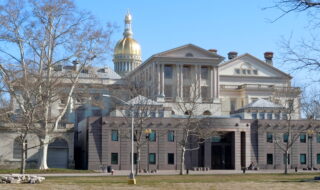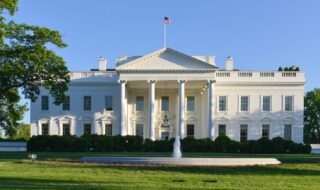May 7, 2021
Consumption Tax Idea Runs Out of Gas
State Director Bob Hallstrom reports from Lincoln on the small-business agenda for the legislative and political week ending May 7
As the 2021 Legislative Session begins to wind down, lawmakers continue to tackle major, contentious issues. Among the high–profile issues addressed by the Legislature during the past week were the following:
- Legislative Bill 131 – Provides $5 million in grant funding to municipalities that incurred extensive natural gas expenses resulting from the extreme cold spell in February
- Legislative Bill 132 – Creates a committee to study public school finance
- Legislative Bill 241 – Provides COVID-19 protections for meat processing workers
- Legislative Bill 454 – Provides extra school aid for rural school districts that currently receive little, if any “equalization” aid (failed to advance)
- Legislative Bill 566 – Funding to assist nonprofits complete capital construction projects interrupted by the pandemic;
- Legislative Resolution 11CA – Replaces many existing taxes with a new “consumption” tax on the use or consumption of taxable property or services (failed to advance).
On tap in the upcoming week is second-round debate on a series of tax relief and spending measures. Major decisions lie ahead as the estimated cost of pending bills with fiscal impacts exceeds the $245 million available for such measures.
Paid Sick Leave Scheduled for Debate
Legislative Bill 258 has surfaced on the legislative agenda, with General File debate anticipated early next week. Introduced by Sen. Tony Vargas (Omaha), and designated as a priority bill by Sen. Matt Hansen (Lincoln), LB 258 would allow employees to accrue a minimum of one hour of paid sick time for every 30 hours worked, with a maximum of 40 hours of paid sick time accrued in a calendar year.
Under the measure, employees would be entitled to use accrued paid sick time beginning on the 60th calendar day following commencement of employment. Paid sick leave would be authorized for:
- an employee’s mental or physical illness, injury, or health condition
- an employee’s need for medical diagnosis, care, or treatment of a mental or physical illness, injury, or health condition
- an employee’s need for preventative medical care
- care of a family member with a mental or physical illness, injury, or health condition
- care of a family member who needs medical diagnosis, care, or treatment of a mental or physical illness, injury, or health condition
- care of a family member who needs preventative medical care
- absence necessary due to domestic abuse, domestic assault, sexual assault, or stalking.
(NFIB Position – Opposed)
We Need You to Act
Please contact your state senator immediately to express opposition to LB 258. In contacting your state senator, please consider the following arguments:
1. Paid sick leave mandate forces small business owners to implement policies that may not be in the best interest of their employees. Small business owners should have the flexibility to shape the type of benefit plan that best suits the needs of their employees.
2. Mandated paid sick leave can hurt the very employees it is designed to assist. Studies reflect that employers faced with mandated leave often respond by laying off employees, reducing hours or eliminating other employee benefits.
3. Small businesses have limited manpower. Having to hire a temporary worker to cover for an employee taking paid sick leave requires small business owners to effectively pay twice for the same work.
E-mail your state senator
In contacting your state senator to support/oppose ___, you may contact him or her via e-mail by using the first letter of their first name, their last name@leg.ne.gov (e.g. mwilliams@leg.ne.gov or jsstinner@leg.ne.gov).
Check out the Unicameral’s website for senator contact information: http://www.nebraskalegislature.gov/senators/senator_list.php
Via mail: all senators have the same PO Box number, City, State and Zip Code
Example:
Senator Matt Williams
District #36, State Capitol
PO Box 94604
Lincoln, NE 68509-4604
Workers Compensation Bills Advance
The Legislature gave first-round approval to the first two workers’ compensation bills to be acted upon during the 2021 Legislative Session. The bills advancing to Select File, are as follows:
- Legislative Bill 256 – Workers’ Compensation – Approval of Lump-Sum Settlement: LB 256, introduced by Sen. Matt Hansen (Lincoln), would clarify that a release of a lump-sum settlement for indemnity benefits only, that is not required to be submitted for approval by the Compensation Court, need not contain allegations regarding eligibility for Medicare if the employee’s right to receive future medical, surgical, and hospital services is specifically excluded from the settlement and Medicare has not paid medical, surgical, or hospital expenses or if Medicare has paid medical, surgical, or hospital expenses for which it claims it is entitled to reimbursement and Medicare has been reimbursed for such expenses at the time the settlement is executed. (NFIB Position-Support)
- Legislative Bill 407 – Workers’ Compensation – Mental Injuries/Mental Illness: Sen. Mike McDonnell (Omaha) has introduced legislation advanced to General File which would allow county correctional officers in a high population county (more than 300,000 inhabitants) to recover benefits for workplace mental injuries and mental illnesses unaccompanied by physical injury. (NFIB Position-Watch)
Property Tax Request Act Advances
- Legislative Bill 644 – Property Tax Request Act: The Legislature has advanced LB 644 to Final Reading. Under LB 644, introduced and designated as a priority bill by Sen. Ben Hansen (Blair), certain political subdivisions (counties, cities, school districts and community colleges) would be required to hold a joint public hearing prior to increasing the property tax requests. The political subdivisions will be required to provide notice of the hearing to taxpayers by postcard, the hearing would be open to public testimony, and the agenda would include only the property tax request proposals. Prior to advancing to the Final Reading, an amendment was adopted to require the joint public hearing to be conducted only if the political subdivisions are seeking to increase the property tax request by more than an “allowable growth percentage,” equal to 2% plus the political subdivision’s real growth percentage. (NFIB Position – Support)
Consumption Tax Proposal Nixed
- LR 11CA – Consumption Tax: LR 11CA introduced and designated as a priority bill by Sen. Steve Erdman (Bayard) fell two votes short of advancing to Select File during the past week. The proposed constitutional amendment would overhaul the state system of taxation by repealing the state’s corporate, income and property taxes, and replacing them with a new consumption tax levied on the purchase of services and new goods. (NFIB Position – Oppose)
Tax and Spending Measures on Deck
Second-round debate on a number of tax relief and spending measures supported by NFIB will be debated in the upcoming week.
- Legislative Bill 64 Taxation of Social Security Benefits: Introduced by Sen. Brett Lindstrom (Omaha), and designated as a priority bill by Senator Mark Kolterman (Seward), LB 64 would provide, for tax years beginning on or after January 1, 2021, for a phased-in reduction of income taxation of Social Security benefits by 5 percent, increasing to 20 percent in 2023 and increasing by 10 percent each year thereafter until federal adjusted gross income is reduced by 100 percent of the benefits for tax years beginning on or after January 1, 2030.
- Legislative Bill 432 – Corporate Income Tax Parity: As amended, LB 432, introduced and designated as a priority by the Revenue Committee, would create parity between the highest marginal individual income tax rate of 6.84% and the top marginal corporate income tax rate by reducing the tax rate on corporate income in excess of $100,000 from 7.81% to 6.84% beginning January 1, 2022. Nebraska’s corporate income tax currently has two brackets. The first $100,000 of taxable income is taxed at 5.58%, with all taxable income in excess of $100,000 taxed at a marginal rate of 7.81%.
- Legislative Bill 388 – Nebraska Broadband Bridge Act: Introduced by Sen. Curt Friesen (Henderson) and designated as a priority bill by Speaker Mike Hilgers (Lincoln), LB 388 would appropriate $20 million annually, beginning with fiscal year 2021-22 to facilitate and fund the development of broadband networks in unserved and underserved areas. The bill would create grants to be used for development costs for a qualifying project and require matching funds from political subdivisions making application for a grant, equal to 50 percent of the total development costs.
Previous Reports and Related Information
- April 2—Tax Reform/Relief Bills Advance
- February 26—A $20-an-hour Minimum Wage?
- February 12—NFIB Members Weigh in on Paid Leave Bill
- January 15—The Legislative Bill Mill Starts Turning

NFIB is a member-driven organization advocating on behalf of small and independent businesses nationwide.
Related Articles














